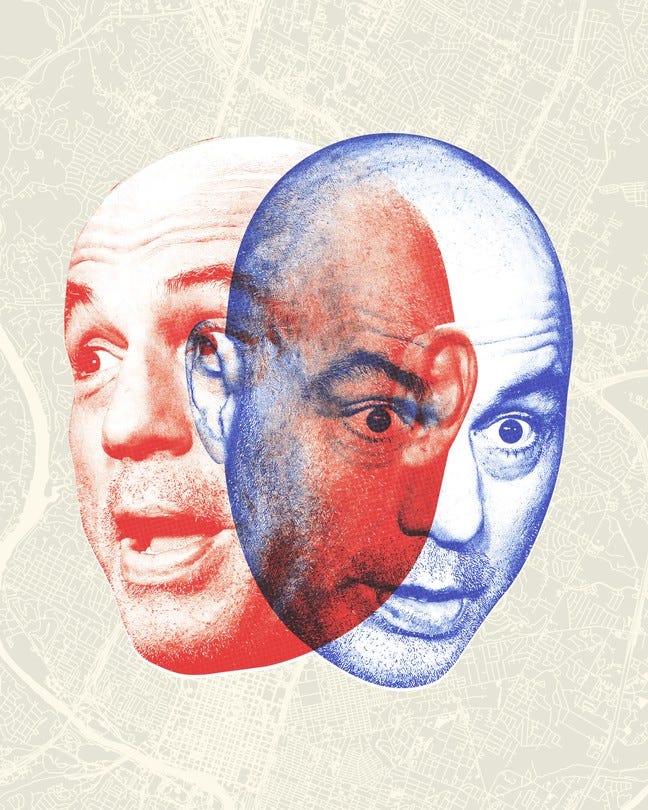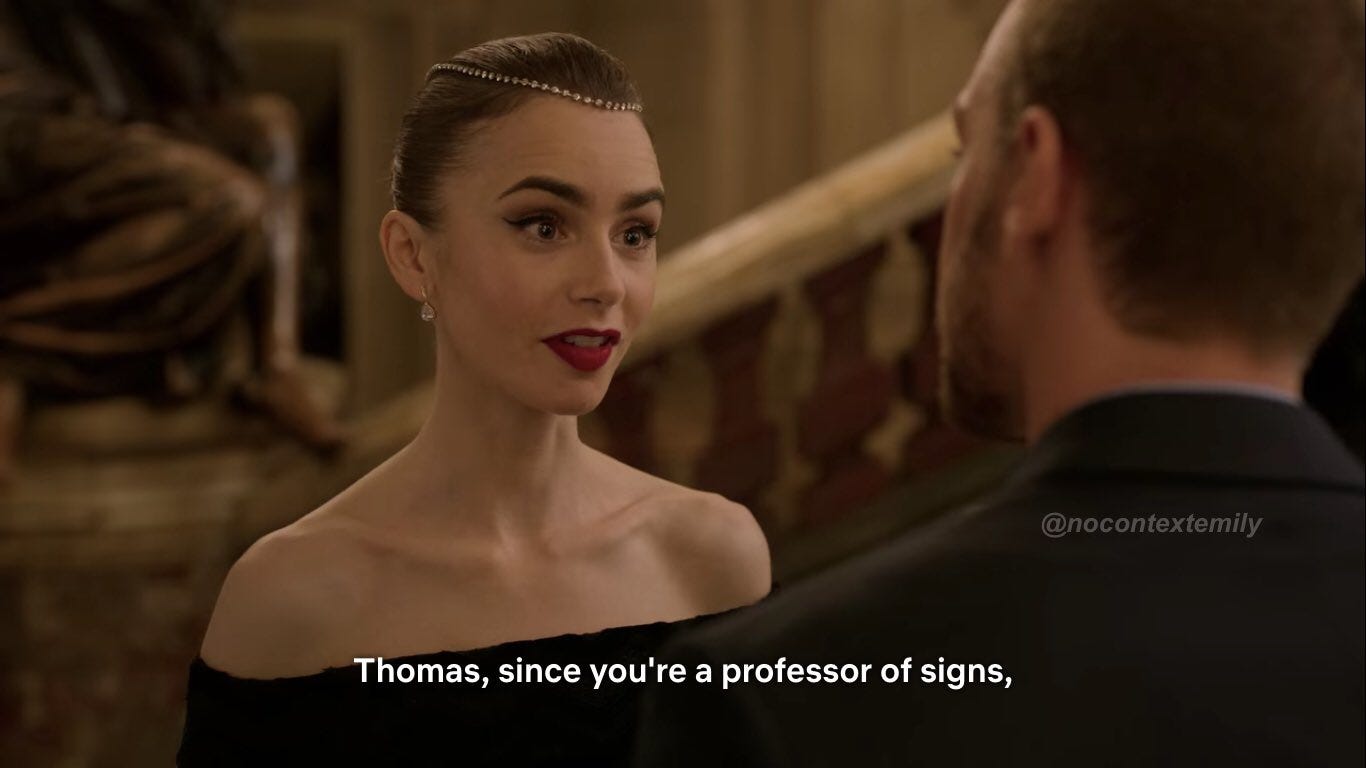Happy Friday!
I am now fully in American politics mode, for which I apologise to British readers. This week, I wrote about JD Vance’s history of strange comments about women (gift link), which involved me going through his back catalogue. What really stood out is that all the comments resurfaced so far come from the period 2020/21, and even within that period, you can watch him get more extreme.
In April 2020, Vance did Eric Weinstein’s podcast—where Weinstein made the wince-worthy comment about the “whole purpose of the postmenopausal female, in theory” being to help raise their own children’s babies. But that phrase sat in the middle of an otherwise relatively sane discussion about American childcare policy, and whether more women would like to stay at home for a bit with kids, but couldn’t afford to do so. The podcast ended with both men “celebrating” their mothers-in-law by name for helping them out.
Unfortunately, Vance’s rhetoric goes downhill from there, and you start getting the attacks on Randi Weingarten for leading a teachers’ union while being childless, and the infamous “childless cat lady” comment on Fox News. I don’t think this is unrelated to the fact that this is exactly the period where Vance was running for the Ohio Senate (the vote was in 2022) and he badly needed to reverse out of his previous criticisms of Donald Trump as “cultural heroin” and “America’s Hitler” and demonstrate his conversion to MAGAdom.
This week, the Atlantic published Tim Alberta’s brilliant profile of Mike Lee (gift link), who was once a prominent Trump critic and now wants to be his attorney-general. The pathology of Lee is exactly the same as in Vance: when Trump became hegemonic, Lee just decided not to fight any more.
Now, Lee says overdone things in support of Trump—because he’s faking it. This is how you know that this is a cult of personality, rather than a coherent ideology: everyone does impressions of the Big Boss, and they often overshoot. Vance now says deliberately, gratuitously rude things about childless women, because he gets applause for them within the bubble, and because he’s desperate to show that he’s renounced his past as a moderate squish.
I find these types of people more grim than Trump, who doesn’t know any better—you might as well get angry with your cat for eating the roast dinner left out on the sideboard. But the Lees and the Vances know. And they do it anyway.
Until next time,
Helen
P.S. I also wrote about Taylor Swift’s endorsement of Kamala Harris, which was striking for its low-key tone. First, I think she’s the only person left doing “when they go low, we go high”. (Even Elizabeth Warren is doing couch jokes.) Second, the Democrats seem to have realised that arguing Trump is a proto-fascist isn’t actually a winning campaign message. People, oddly, respond better to “well, I can see why you like him but I don’t think he’s any good.”
So You Think You’re Heterodox? (The Atlantic, gift link)
It’s a Tuesday night in downtown Austin, and Joe Rogan is pretending to jerk off right in front of my face. The strangest thing about this situation is that millions of straight American men would kill to switch places with me.
Centimillionaires generally pride themselves on their inaccessibility, but most weeks you can see Rogan live at the Comedy Mothership, which he owns, in exchange for $50 and a two-drink minimum. About 250 tickets for each “Joe Rogan and Friends” show go on sale every Sunday at 2 p.m. central time, and disappear within seconds. When you arrive at the Mothership, the staff locks your phone in a bag, which both ensures that you cannot leak footage online and makes you think you’re about to see some really forbidden shit.
You are not.
*
It’s finally here! My longread on Joe Rogan, and the city of Austin—which has lately become a magnet for manosphere influencers, productivity optimizers, stand-ups, and male-wellness gurus. Austin is at the nexus of a Venn diagram of “has culture,” “has gun ranges,” “has low taxes,” and “has kombucha.”
But all is not well in this Texan Eden: “‘Anti-wokeness’ once encompassed everyone who could agree that Drew Barrymore’s talk show was annoying, that some left-wing activists on TikTok were out of control, and that corporations were largely banging on about diversity to sell more products rather than out of a genuine commitment to human flourishing.” The Roganite coalition of disgruntled liberals and social conservatives is now fracturing.
Michael Sheen: I wanted to be seen as the greatest actor of all time (The Guardian)
He admits that for many years he didn’t have a clue about the reality of life in Port Talbot. He had always lived in one bubble or another. His parents were hardly flush, but they had decent jobs – his mother was a secretary, his father a personnel manager at British Steel, and both were active in amateur dramatics. Sheen was academically gifted (he considered studying English at Oxford University before winning a place at Rada), a talented footballer (he had trials with Cardiff and Swansea) and an exceptional young actor. Then came the bubble of Rada and London, followed by the bubble of LA.
It was only when he started to work on The Passion that he began to understand his home town. One day he was rehearsing with a group in a community hall when he was approached by a woman. “She told me she was the mother of this boy who’d been in my class at school called Nigel. When I was 11, he fell off a cliff in an accident and died. It was the first time I’d known someone to die. She said, ‘I’ve started up a grief counselling group here. I have a little bit of money from the council because there is no grief counselling in this area.’” She’d had no counselling when Nigel died, nor in the 31 years since. “And all these years later, she’d set up a little grief counselling thing with a bit of money, so that was extraordinary to hear.” Next time he returned he discovered that the group no longer existed because of council cuts.
*
I really admire what Michael Sheen has done these last few years—returned home to the small Welsh city of Port Talbot, and tried to build institutions there. It sounds so much more spiritually nourishing than living in LA and getting your fifth brow lift.
Quick Links
This week, the ONS admitted that its incredibly confusing “gender identity” census question was not fit for purpose, as academics had pointed out ahead of time. The ONS position became indefensible when it emerged that the highest number of trans people was being recorded in places with high immigration—ie people with English as a second language, who just didn’t understand the jargon-laden question. The retraction is here.
“My suspicion is that many more men than we realise are living lives of secret woman-hatred.” I have found the trial of Dominique Pelicot, who is charged with inviting men to rape his unconscious wife, very difficult to read about. The horror is so gothic that it’s almost unbelievable, as is the fact that he found at least 70 men in the local area who agreed to the scenario. Rachel Hewitt and Caroline Criado Perez have both written beautifully about it.
“A good example of a famous name few recognize today is Winston Churchill. No, not the British one. I’m talking about the wildly popular American author of such (once) classics as Mr. Keegan's Elopement and Mr. Crewe's Career. Such books made him so well known that the British Winston Churchill had to write under the pen name Winston Spencer Churchill (or Winston S. Churchill) to avoid confusion.” (Substack)
Ben Ansell and Sam Freedman on the U.S. election polling: it’s too close to call. We just don’t know how to control for shy Trumpers/swapping out Biden for Harris.
I loved Arlie Hochschild’s work since Laura Mc introduced me to her years ago. Strangers in Their Own Land is the smartest thing written about the Tea Party—she goes to Louisiana and asks why people vote to slash red tape in a state riven with pollution. Her new book Stolen Pride focuses on Kentucky, and suggests that Donald Trump’s biggest fans aren’t the poor and white, but “the elite of the left-behind . . . [people] who were doing well within a region that was not.” That’s an interesting way of framing it: the guy who owns the boat dealership, say, or the car wash, in a deprived area. Can’t wait to read the whole book.
“But perhaps a more interesting way in which desires seem to have changed over the decades is that they have got a lot more boring. […] In fact, this book is generally so vanilla that, perhaps anticipating disengagement from readers in advance, [Gillian] Anderson is forced to entice us with the promise that her own fantasy is included among the anonymous offerings. Certainly, this keeps the reader more alert than she otherwise might have been. Is it the one about the door handle, one wonders? Or maybe the one about the Weasley twins?” This Kathleen Stock review of Gillian Anderson’s collection of sex fantasies made me laugh more than once (Unherd).
“In total, there are around 500 different josuushi [counting suffixes] in the Japanese language. Other common josuushi are 人 nin for people, 匹 hiki for animals roughly smaller than people, 頭 tou for animals roughly larger than people, 羽 wa for birds, 本 hon for long objects, 枚 mai for flat and thin objects, and 個 ko for smallish objects that aren't too long or too flat.” Thanks to the Browser for this link to a blog on Japanese counting, which makes me want to cry.
Bluestocking recommends: the new series of Colin From Accounts, the Australian sitcom about a couple and their paralysed dog. Trust me on this one: the latest series features three character who are extremely high, staring at the dog, until one says: “I’m sorry we domesticated you.” (BBC iPlayer).
I also recommend Emily in Paris, which is what happens when you’re the guy who created Sex and The City in the 90s, and American telly is a bit too right-on for you these days. What to do? Why, set your show in France, the land that HR forgot! Then it can be all people smoking and having affairs and pissing in public, while wearing gorgeously styled tweed miniskirts and Louboutins. Honestly, the broad French stereotypes in this show have to be seen to be believed; at one point, Emily starts chatting to a man reading a book outside a cafe, and asks what he does. His reply: “I’m a professor of semiotics.” ENCORE ENCORE INJECTE-LE DANS MES VEINES!
See you next time! If you’ve been forwarded this email and you’d like to subscribe, click below for a free weekly digest of whatever I’m currently reading:






From the Rogan article: “It’s good to be open-minded, but not so much that your brain falls out.” [Chef’s kiss emoji]
It used to be in US politics that presidential candidates wanted to be the guy you went for a beer with. Reading the Atlantic link about Vance reinforces that, on the right anyway, they're competing to be that bloke at the bar who you try to avoid eye contact with and even makes the landlord look uncomfortable.